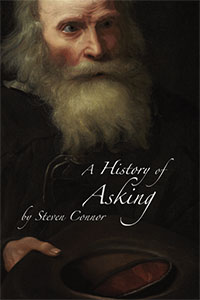A History of Asking, by Steven Connor - new open access book from OHP
 Wednesday, May 17, 2023 at 9:44AM
Wednesday, May 17, 2023 at 9:44AM Open Humanities Press is pleased to announce the publication of A History of Asking, by Steven Connor.
Like all Open Humanities Press books, A History of Asking is available open access (it can be downloaded for free):
http://www.openhumanitiespress.org/books/titles/a-history-of-asking/
Book description:

Asking is one of the simplest and most familiar of human actions, and has a right to be thought of as single most powerful and most variously cohering form of social-symbolic gesture. Because so much is at stake in the act of asking, asking, or asking for, almost anything, whether information, help, love or respect, can be asking for trouble, so a great deal of care must be taken with the ways in which asking occurs and is responded. A History of Asking is the first attempt to grasp the unity and variety of the technics and technologies of asking, in all its modalities, as they extend across a spectrum from weak forms like begging, pleading, praying, imploring, beseeching, entreating, suing, supplicating and soliciting, through to the more assertively and even aggressively self-authorising modes of asking, like proposing, offering, inviting, requesting, appealing, applying, petitioning, claiming and demanding. The book considers the history of 6 broad modes of petitory practice. The act of begging, both among animals and humans is considered in terms of its theatrics. The institution of the political petition, protocols for which seem to arise in also every system of government of which we have knowledge, is tracked through from late medieval to nineteenth-century Britain. The act of prayer, central to religious practice, though often the last form of religious behaviour to fall away among those lapsing from adherence, and one of the religious practices that is most likely to be adhered to in the absence of any other religious commitment, is the subject of sustained scrutiny. The appeal of prayer is essentially to the fact of participation in language, and the specific forms of commitment to the condition of being bound, bindable, or biddable by it. Wooing and the associated economics of seduction and solicitation are tracked through from the formalisation of the conventions of courtly love in the 12th century through to modern techniques of flirtation. The book revives the antique term ‘suitage’ in order to discuss all the forms of sueing and suitorship for favours or advantage, as well as, more broadly the act, pursued almost life-long, of trying to get one another to do things for us, in particular in indirect or vicarious forms of what may be called ‘interpetition’, such as the dedications of books to patrons, the institution of the testimonial or letter of reference and the practices of flattery. A History of Asking concludes with a discussion of the many ways in which our necessarily parasitic relations on each other in a complex society are both conveyed and dissimulated, especially through the ways in which we summon and salute different kinds of service.
Author Bio
Steven Connor is Grace 2 Professor of English Emeritus in the University of Cambridge and Professor of Living Well with Technology at King’s College London. He is a writer, critic and broadcaster, who has published books on Dickens, Beckett, Joyce and postmodernism, as well as on topics such as ventriloquism, skin, flies, air and numbers. His website at http://stevenconnor.com includes lectures, broadcasts, unpublished work and work in progress.







Reader Comments